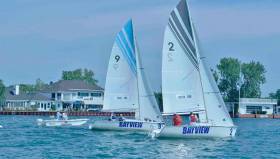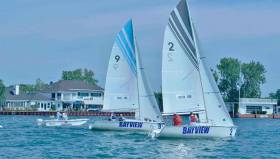Displaying items by tag: Detroit Cup
Tough Week For Trinity Trio At Detroit Cup
#TeamRacing - It was a tough week in Michigan for Dan Gill, Richard Roberts and Scott Flanigan at the 10th annual Detroit Cup, which concluded yesterday (Sunday 27 August).
But the TCD team racing trio managed to stay above the bottom of the final standings, scoring a win against the Australian contingent headed by Will Boulden that took the petit final to secure third place.
Defending champions Harry Price, Murray Jones and Cameron Seagreen of DownUnder Racing had little trouble defending their title despite conditions that ranged from light and flunky to moderate over the four days of competition.
Australian Price is now the only two-time winner of the Detroit Cup, solidifying his team’s six position in the world match race rankings.
Trinity Trio In Stateside Competition At 10th Detroit Cup
#TeamRacing - Afloat’s Sailor of the Month for March is competing with his Trinity College teammates at the Detroit Cup in the USA this week.
Richard Roberts joins fellow TCD helmsmen Scott Flanigan and Dan Gill on the Plain Sailing team at the 10th anniversary of the Bayview Yacht Club team racing event, which starts tomorrow (Thursday 24 August) with the round robin portion.
Eight skippers and crews representing five nations will take part in the four-day competition that marks the second stage of the USA Grand Slam series, as Scuttlebutt Sailing News reports.
The fleet includes defending champion Harry Price and his DownUnder Racing team from Sydney, Australia, alongside Murray Jones and Cameron Seagreen – currently ranked sixth in the world team racing stakes.






























































